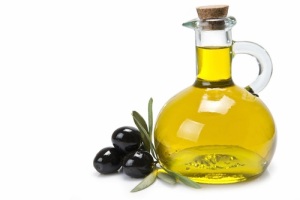There is many options when it comes to selecting fats and oils for cooking. But it’s not just a matter of choosing oils that are healthy, but also whether they stay healthy after having been cooked with.
The Stability of Cooking Oils
When you’re cooking at a high heat, you want to use oils that are stable and don’t oxidize or go rancid easily.
When oils undergo oxidation, they react with oxygen to form free radicals and harmful compounds that aren’t recommendable to eat.
The most important factor in determining an oil’s resistance to oxidation and rancidification, both at high and low heat, is the relative degree of saturation of the fatty acids in it. Saturated fats have only single bonds in the fatty acid molecules, monounsaturated fats have one double bond and polyunsaturated fats have two or more. It is these double bonds that are chemically reactive and sensitive to heat.
Saturated fats and monounsaturated fats are pretty resistant to heating, but oils that are high in polyunsaturated fats should be avoided for cooking.
COCONUT OIL
Over 90% of the fatty acids in it are saturated, which makes it very resistant to heat. This oil is semi-solid at room temperature and it can last for months and years without going rancid.
Coconut oil also has powerful health benefits. It is particularly rich in a fatty acid called Lauric Acid, which can improve cholesterol and help kill bacteria and other pathogens.
Coconut oil improves blood lipids in both animals and humans. The virgin coconut oil significantly reduced Total and LDL cholesterol, oxidized LDL, triglycerides and increased HDL (the good) cholesterol.
It also had favorable effects on blood coagulation factors and antioxidant status.
In a study of women with abdominal obesity, coconut oil increased HDL and lowered the LDL:HDL ratio, while soybean oil increased Total and LDL cholesterol and decreased HDL.
Medium chain triglycerides (the fats in coconut oil) have also been shown to reduce blood triglycerides compared to long chain fats.
The fatty acids in coconut oil can increase energy expenditure, improve satiety and help you lose weight.
Coconut oil is high in Medium Chain Triglycerides, which are fatty acids that are metabolized differently than most other fats, leading to beneficial effects on metabolism.
Many studies show that medium chain triglycerides can boost metabolism, in one study increasing energy expenditure by 120 calories per day.
Many studies show that people who add Medium Chain Fatty Acids to their diet have reduced appetite and start eating fewer calories automatically.
Eating coconut is particularly effective at reducing the harmful belly fat in the abdominal cavity, which is strongly associated with disease.
Coconut oil is likely to turn into ketone bodies in the liver . Ketone bodies can provide energy for the brain. They are particularly useful against epilepsy and may also improve various other disorders.
Coconut oil can be applied topically as well, studies showing it to be effective as a skin moisturizer and protecting against hair damage. It can also be used as a mild form of sunscreen and as mouthwash.
Studies show that the fatty acids in coconut oil can increase blood levels of ketone bodies, supplying energy for the brain cells of Alzheimer’s patients and relieving symptoms.
The saturated fats used to be considered unhealthy, but new studies prove that they are totally harmless. Saturated fats are a safe source of energy for humans.
OLIVE OIL
Some studies show that olive oil can improve biomarkers of health.
It can raise HDL (the good) cholesterol and lower the amount of oxidized LDL cholesterol circulating in your bloodstream.
Studies on olive oil show that despite having fatty acids with double bonds, you can still use it for cooking as it is fairly resistant to the heat.
Many studies show the antioxidant activity of natural phenols on olive oil.
The chief active components of olive oil include oleic acid, phenolic constituents, and squalene. The main phenolics include hydroxytyrosol, tyrosol, and oleuropein, which occur in highest levels in virgin olive oil and have demonstrated antioxidant activity. Antioxidants are believed to be responsible for a number of olive oil’s biological activities. Oleic acid, a monounsaturated fatty acid, has shown activity in cancer prevention, while squalene has also been identified as having anticancer effects. Olive oil consumption has benefit for colon and breast cancer prevention. The oil has been widely studied for its effects on coronary heart disease (CHD), specifically for its ability to reduce blood pressure and low-density lipoprotein (LDL) cholesterol. Antimicrobial activity of hydroxytyrosol, tyrosol, and oleuropein has been demonstrated against several strains of bacteria implicated in intestinal and respiratory infections. Although the majority of research has been conducted on the oil, consumption of whole olives might also confer health benefits.
Culinary Applications
PALM OIL
Palm oil is derived from the fruit of oil palms. It consists mostly of saturated and monounsaturated fats, with small amounts of polyunsaturates.
This makes palm oil a good choice for cooking.
Red Palm Oil (the unrefined variety) is best. It is also rich in Vitamins E, Coenzyme Q10 and other nutrients.
However, some concerns have been raised about the sustainability of harvesting palm oil, apparently growing these trees means less environment available for Orangutans, which are an endangered species.
AVOCADO OIL
The composition of avocado oil is similar to olive oil. It is primarily monounsaturated, with some saturated and polyunsaturated mixed in. It can be used for many of the same purposes as olive oil. You can cook with it, or use it cold.
Avocado is a green, pear-shaped fruit often called an “alligator pear.” It is loaded with healthy fats, fiber and various important nutrients.
Avocados have a unique nutrition profile. They contain lots of fiber and are rich in vitamins and minerals, such as B-vitamins, vitamin K, potassium, copper, vitamin E and vitamin C. The consumption of avocados has been associated with various health benefits, such as decreased risk of cardiovascular disease. They are also very satiating and may be useful for weight loss.
Avocados are very high in potassium, which should support healthy blood pressure levels.
Avocados and avocado oil are high in monounsaturated oleic acid, a “heart healthy” fatty acid that is believed to be one of the main reasons for the health benefits of olive oil.
Avocados tend to be high in fiber, about 7% by weight, which is very high compared to most other foods. Fiber can have various important benefits for weight loss and metabolic health.
Numerous studies have shown that eating avocado can improve heart disease risk factors like Total, LDL and HDL cholesterol, as well as blood triglycerides.One of the studies showed that including avocado in a low-fat vegetarian diet led to improvements in the cholesterol profile.
One dietary survey found that people who ate avocados had a much higher nutrient intake and had a lower risk of metabolic syndrome.
Studies have shown that eating avocado or avocado oil with veggies can dramatically increase the amount of antioxidants you take in.
Avocados are high in antioxidants, including Lutein and Zeaxanthin. These nutrients are very important for eye health and lower the risk of macular degeneration and cataracts.
Some studies in isolated cells have shown that nutrients in avocados may have benefits in preventing prostate cancer, and lowering side effects of chemotherapy in some cells.
Studies have shown that an extract from avocado and soybean oils can significantly reduce symptoms of osteoarthritis.
FISH OIL
Fish oil is very rich in the animal form of Omega-3 fatty acids, which are DHA and EPA. A tablespoon of fish oil can satisfy your daily need for these very important fatty acids.
The best fish oil is cod fish liver oil, because it is also rich in Vitamin D3, which a large part of the world is deficient in.
However, due to its high concentration of polyunsaturated fats, fish oil should never be used for cooking. It’s best used as a supplement, one tablespoon per day. Keep in a cool, dry and dark place.
FLAXSEED OIL
Flax oil contains lots of the plant form of Omega-3, Alpha Linolenic Acid (ALA). Many people use this oil to supplement with Omega-3 fats. However, unless you’re vegan, then I do recommend that you use fish oil instead.
Evidence shows that the human body doesn’t efficiently convert ALA to the active forms, EPA and DHA, of which fish oil has plenty.
Supplementation with flax oil and vitamin C improves the outcome of Attention Deficit Hyperactivity Disorder (ADHD).
Flaxseed oil has been found to be beneficial for those who suffer from Crohn’s Disease and Colitis. Several studies have found that this oil seems to be able to calm the inner lining of the inflamed intestines. Another benefit exists as there is a high content of mucilage in flax and this is an effective natural laxative.
Some people are afflicted with Sjogren’s syndrome, which is a dryness of the eyes. Flaxseed oil helps to improve this condition.
Flaxseed oil also helps to:
- Reduce the risk of cancer.
- Aid in the growth of healthy hair and nails.
- Promote healthy skin.
- Reduce menopause symptoms.
- Play a role in burning body fat.
Due to the large amount of polyunsaturated fats, flax seed oil should NOT be used for cooking.
NUT OILS and PEANUT OIL
Peanut oil, as the name implies, is a type of vegetable oil commonly used in cooking that is derived from peanuts, which are legumes. Peanut oil comes in a number of varieties, including refined, unrefined, roasted and cold-pressed, which have slight differences in their nutritional value and health benefits. Generally, people use peanut oil in their cooking for the interesting flavor that it can give to the food, particularly if you use the roasted variety, as well as the fact that it is healthier than many other types of oil.
However, they are very rich in polyunsaturated fats, which make them a poor choice for cooking. They can be used as parts of recipes, but do not fry or do any high heat cooking with them.
There is one exception, however, and that is macadamia nut oil, which is mostly monounsaturated (like olive oil), it is possible to use it for low- or medium-heat cooking.
Some of the health benefits of peanut oil include its ability to reduce cholesterol levels, protect heart health, prevent cancer, boost cognitive function, improve the nervous system, strengthen the immune system, lower blood pressure, and protect the skin.
SEED and VEGETABLE OILS
Industrial seed and vegetable oils are highly processed, refined products that are way too rich in Omega-6 fatty acids.
Not only should you not cook with them, you should probably avoid them altogether.
These oils have been wrongly considered “heart-healthy” by the media and many nutrition professionals in the past few decades.
However, new data links these oils with many serious diseases, including heart disease and cancer.
Avoid all of them:
- Soybean Oil
- Corn Oil
- Cottonseed Oil
- Canola Oil
- Rapeseed Oil
- Sunflower Oil
- Sesame Oil
- Grapeseed Oil
- Safflower Oil
- Rice Bran Oil
The processing method for industrial seed- and vegetable oils involves factories, many machines and chemicals like hexane.
Seed oils are high in Omega-6 fatty acids. Eating an excess of Omega-6 can lead to increased inflammation in the body and potentially contribute to disease.
Oils that are high in polyunsaturated fats are very susceptible to oxidation, both on the shelf and inside our bodies. They may also be high in trans fats.*
Several randomized controlled trials show that Omega-6 fatty acids increase death from heart disease, while other studies show no statistically significant effect. Observational studies show a strong association.
Also avoid all margarines and fake butters.









